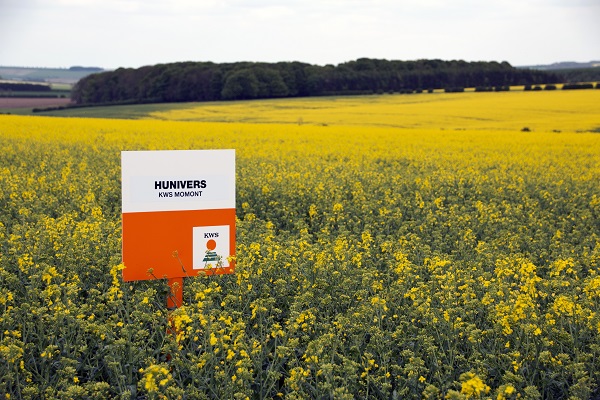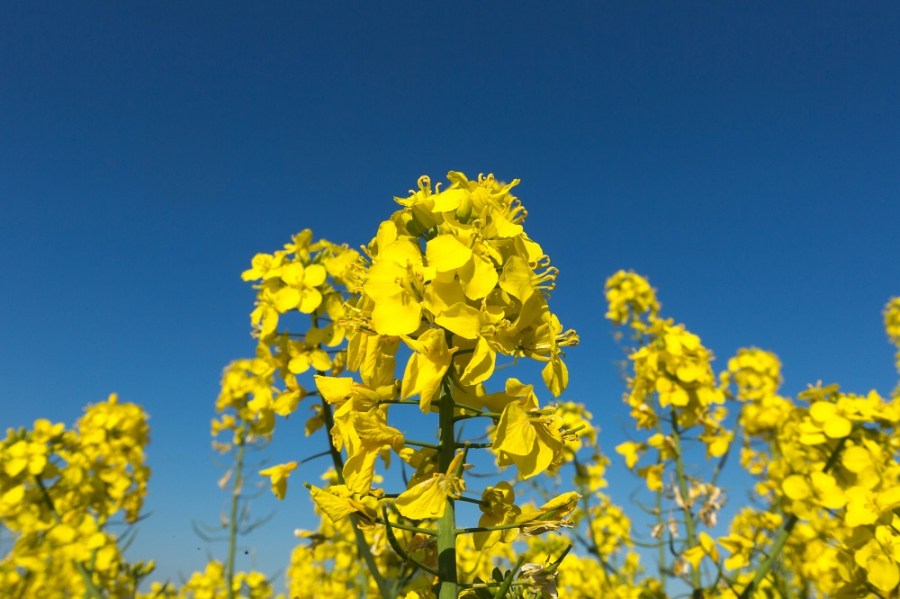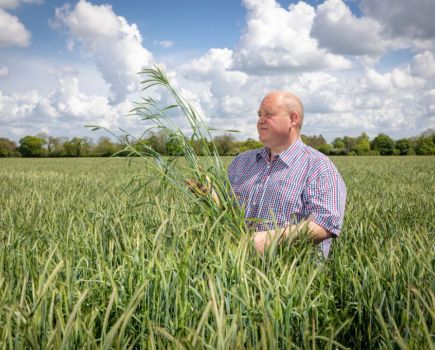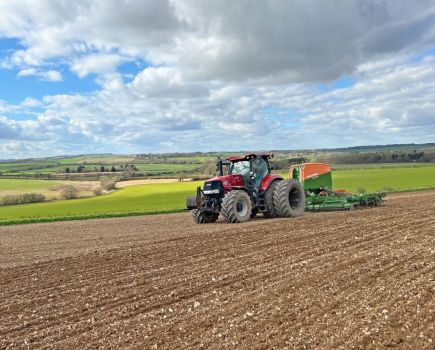KWS has broken new ground with its first hybrid oilseed rape variety for the UK. CPM reviews Hunivers, its latest candidate set to come into the UK market.
There’s no shortage of hybrids to pick from but not many with this high yield potential and solid disease package.
By Melanie Jenkins
Hailing from KWS’ French arm Momont, Hunivers is its first hybrid variety to be launched in the UK. The firm has a reputation for producing strong conventional varieties, so the step into hybrid territory is a new one and could well be an exciting area for growers.
Hunivers is currently an AHDB Recommended List candidate variety for the East and West regions and with a yield of 106.6% against the controls, looks set to proclaim KWS’ entry to the UK hybrid market loud and clear.
It’s the breeder’s first really good shot at a hybrid, says the firm’s Carl Gibbard. “We’re really known for our conventional varieties and our hybrids had just fallen short for RL trials. With hybrid material we usually see the potential one year ahead of National List testing but we saw Hunivers about four to five years ago and it stood out as the strongest hybrid.”

With a yield of 106.6% Hunivers is the leading candidate variety on AHDB Recommended List.
Though it has been bred in France, Hunivers was specifically part of a UK selection process, he explains. “All hybrid production takes place in France as there are big fields and production can be isolated.” However, the selection procedure is very tailored to the UK. “We’re looking for early vigour, a robust disease package that doesn’t rely on common genes and a high gross output. It’s the first hybrid that really fulfils this criteria and the first contender that suits conditions in the UK.”
For Julie Goult at KWS, it’s exciting that the selection techniques and criteria have produced a variety suited to the UK grower. “From a commercial angle, it’s a great opportunity that we’re seeing hybrids coming through from a programme that has produced so many good conventional varieties – so we can now offer these attributes to hybrid growers as well.”
David Leaper at Agrii agrees that KWS has been very successful with its conventional varieties. “To breed good hybrids, you need good conventionals.”
In terms of adding diversity to KWS’ portfolio, Carl sees Hunivers as a real positive. “We’re also working on developing Clearfield and clubroot-resistant varieties – so it’s a step towards a more diverse range.”
KWS’ maritime and continental programmes are likely to produce more hybrids suited to the UK in the next few years, says Julie. “Hunivers isn’t the first hybrid through the programme but it’s the first with the right attributes and yield levels from our perspective.”
The variety has proven itself through trials, and in National List testing was the top gross output hybrid variety after two years, adds Carl. “It has really shown promise the whole time we’ve seen it. It’s a consistent and reliable variety when it comes to yield and has been a strong candidate the whole way though.”
It’s clearly going to attract interest as the highest gross output variety, says Barry Barker at Agrii. “It doesn’t have the highest oil content but it’s more than acceptable.”
Hunivers is a brand new hybrid to Richard Torr at Wynnstay. “The majority of our sales are in hybrids and I don’t see the situation changing. Growers really value the vigour, consistency and ability to perform at lower sowing rates,” he explains “We often get slightly more favourable establishment conditions in the West and growers sowing at a lower seed rate and are therefore happy and more confident using a hybrid.”
The variety has a good solid disease resistance, which is so important these days, says Barry. “I don’t think anything with poor light leaf spot has very good legs in the market anymore.”
Richard agrees – and says that most people concerned with LLS want a minimum score of 6. “Often the varieties that have the LLS resistance then fall short on phoma stem canker. It’s often a case of play off, one against the other with a high yield, but this will give growers peace of mind.”
Hunivers has a really good disease package, explains Carl. “It’s holding up well in trials and is currently being screened for verticillium wilt, so we should know soon if it’s resistant.”
David thinks that it’ll be worth checking its verticillium wilt status. “We think that it’s an important disease because it affects the yield near the end of the life of the crop.”
Other high yielding hybrids have often had issues around disease ratings, says Richard. “But Hunivers doesn’t appear to have a weakness.”
Suited to all soil types, Hunivers can be drilled even when the seedbed is more challenging, explains Carl. “As it has a lot of vigour it can take a bit more of a challenge.”
David suggests that it could suit more fertile soils. “It wouldn’t get too proud before winter, but don’t drill it too early and then you’ll have more ability to manage it in the spring.”
It’s particularly suited to a medium drilling slot and is similar to Campus for autumn vigour, says Carl. “It has typical hybrid vigour and is fast to get up and away.” He has seen Hunivers at KWS’ trial site at Framlingham, Suffolk and says that it’s standing very well there on fertile soils.
However, David disagrees with Carl’s view on autumn vigour. Across Agrii’s nine UK trials this year Hunivers has demonstrated what he thinks is characteristically slow development in the autumn. “It’s also had relatively slow spring growth. This is a characteristic that some might question but there’s certainly a place for it in an earlier drilling window.”
Barry agrees that it shouldn’t be drilled too late, so it can establish a good canopy. “It really fits into the mid Aug to mid Sep drilling window.” The variety’s spring growth habit is similar to that of Alizze, which has good spring vigour, he adds. “It also stands well and isn’t too late.”
In terms of maturity, it’s a step up for KWS’ material, with an earlier maturing score, says Carl.
Richard says that if he were picking holes, then Hunivers is slightly taller than a perfect variety and is quite a bulky hybrid. “It seems robust in terms of lodging though.”
Though Hunivers isn’t up for recommendation further north, Barry speculates that this could be because of lower yields, although there are no figures to back this up. “However, AHDB does tend to select different varieties to put up for recommendation in the North.” He sees no reason at all why – in terms of disease resistance – it shouldn’t be grown across the country.
David agrees that he would contest AHDB’s positioning with the variety slightly. “It ticks all the boxes for LLS and has a stiff canopy.” He suggests it’s similar to Wembley and Alizze and could be positioned alongside them to provide a yield comparison.
Hunivers will suit growers who are looking to maximise production, says Richard. “At the moment it’ll be an attractive option for growers who are prepared to invest in a relative unknown for the maximum returns and to push the boundaries on the yields they can get.”
It looks as though it could, with a decent year, be the highest yielding hybrid available, says Richard. “So it’ll be interesting to get a third year of data but what we’ve seen in these first two years of trials, we’ve liked. In 12 months’ time, it could well be one of our biggest varieties as everything looks strong.”
This coming year will be a good chance for growers to see it next to other varieties, he adds. “There’s no shortage of hybrids to pick from but not many with this high yield potential and solid disease package.”
As a new variety for this year, it’ll be available in limited quantities this autumn,” says Barry. “None of the stock has been grown in the UK – it has all been grown in France and will be brought over once the French harvest is complete.”
Farmers won’t launch themselves into big acreages of new varieties as they want to see where and how they’ll fit onto the farm, says David. “So generally, in its second year the acreage will expand and I expect significant sales and that it’ll do well.”
Barry adds: “Hunivers ticks all the boxes in terms of being a key solid type that growers are now looking for – so there’s a chance it could do pretty damn well this year.”
Hunivers at a glance





